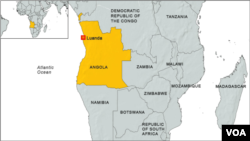The country's law enforcement authorities have also been accused of the arbitrary arrests and detention of hundreds, the NGO said in a statement.
Angolan law enforcement authorities including police, state security and intelligence services "have been implicated in unlawful killings of at least 15 people," HRW said.
Political activists, artists and protest organizers were the main targets of the "alleged rights violations," which HRW has condemned.
"Angolan authorities should urgently act to end abusive police policies and practices and ensure that there is justice for victims and their family members," Zenaida Machado, senior Africa researcher at HRW said in the statement.
Although the government has attempted to improve law enforcement, criminal prosecutions against police officers who commit these violations remain rare, HRW said.
The arrests are more frequent in the oil rich northern province of Cabinda.
In the last six months, HRW has interviewed 32 people across the country including victims and their relatives, witnesses and security sources.
In one instance, men who identified as criminal investigation service members held a group of young men in custody whose bodies were found three days later at a hospital morgue, HRW said.
A friend of the victims, who were known for participating in anti-government protests, said that police had been monitoring the group.
Angola's ruling party, the People's Movement for the Liberation of Angola (MPLA), have denied HRW's claims.
"Investigations are already underway," party spokesman Rui Falcao told AFP. "However, we find it strange that those calling for the necessary investigations already have conclusions and are passing judgement."
According to the HRW, the country's leading opposition, UNITA, said it had documented over 130 cases of people being killed by security forces during protests since 2017.
On Saturday, thousands of people called for Angola's President Joao Lourenco to step down during a rally in the capital organized by UNITA to commemorate its late leader.
The oil-rich southern African nation has experienced a wave of protests since the government cut subsidies for petrol in June.
The move was aimed at curbing government spending, as the economy suffers from a slide in oil prices that has weakened the local currency, the kwanza. But it resulted in unpopular sharp fuel price hikes.





![HRW Calls For ICC Investigation of Darfur 'War Crimes' [5:40]](https://gdb.voanews.com/075c8f4e-35c2-4e06-ba2d-6b5016287953_cx0_cy3_cw100_w33_r1.jpg)




Forum